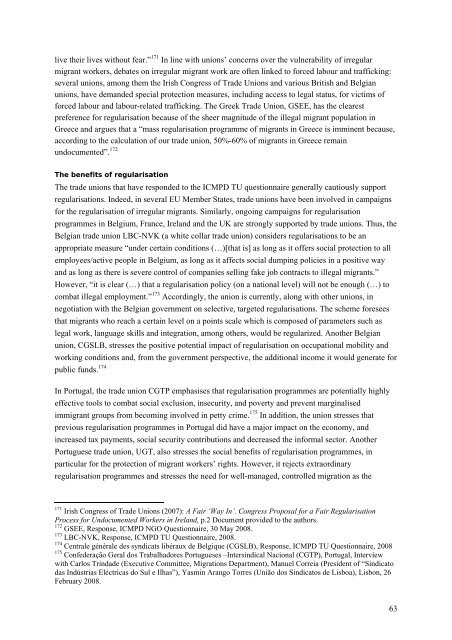REGINE Regularisations in Europe Final Report - European ...
REGINE Regularisations in Europe Final Report - European ...
REGINE Regularisations in Europe Final Report - European ...
Create successful ePaper yourself
Turn your PDF publications into a flip-book with our unique Google optimized e-Paper software.
live their lives without fear.” 171 In l<strong>in</strong>e with unions’ concerns over the vulnerability of irregular<br />
migrant workers, debates on irregular migrant work are often l<strong>in</strong>ked to forced labour and traffick<strong>in</strong>g:<br />
several unions, among them the Irish Congress of Trade Unions and various British and Belgian<br />
unions, have demanded special protection measures, <strong>in</strong>clud<strong>in</strong>g access to legal status, for victims of<br />
forced labour and labour-related traffick<strong>in</strong>g. The Greek Trade Union, GSEE, has the clearest<br />
preference for regularisation because of the sheer magnitude of the illegal migrant population <strong>in</strong><br />
Greece and argues that a “mass regularisation programme of migrants <strong>in</strong> Greece is imm<strong>in</strong>ent because,<br />
accord<strong>in</strong>g to the calculation of our trade union, 50%-60% of migrants <strong>in</strong> Greece rema<strong>in</strong><br />
undocumented”. 172<br />
The benefits of regularisation<br />
The trade unions that have responded to the ICMPD TU questionnaire generally cautiously support<br />
regularisations. Indeed, <strong>in</strong> several EU Member States, trade unions have been <strong>in</strong>volved <strong>in</strong> campaigns<br />
for the regularisation of irregular migrants. Similarly, ongo<strong>in</strong>g campaigns for regularisation<br />
programmes <strong>in</strong> Belgium, France, Ireland and the UK are strongly supported by trade unions. Thus, the<br />
Belgian trade union LBC-NVK (a white collar trade union) considers regularisations to be an<br />
appropriate measure “under certa<strong>in</strong> conditions (…)[that is] as long as it offers social protection to all<br />
employees/active people <strong>in</strong> Belgium, as long as it affects social dump<strong>in</strong>g policies <strong>in</strong> a positive way<br />
and as long as there is severe control of companies sell<strong>in</strong>g fake job contracts to illegal migrants.”<br />
However, “it is clear (…) that a regularisation policy (on a national level) will not be enough (…) to<br />
combat illegal employment.” 173 Accord<strong>in</strong>gly, the union is currently, along with other unions, <strong>in</strong><br />
negotiation with the Belgian government on selective, targeted regularisations. The scheme foresees<br />
that migrants who reach a certa<strong>in</strong> level on a po<strong>in</strong>ts scale which is composed of parameters such as<br />
legal work, language skills and <strong>in</strong>tegration, among others, would be regularized. Another Belgian<br />
union, CGSLB, stresses the positive potential impact of regularisation on occupational mobility and<br />
work<strong>in</strong>g conditions and, from the government perspective, the additional <strong>in</strong>come it would generate for<br />
public funds. 174<br />
In Portugal, the trade union CGTP emphasises that regularisation programmes are potentially highly<br />
effective tools to combat social exclusion, <strong>in</strong>security, and poverty and prevent marg<strong>in</strong>alised<br />
immigrant groups from becom<strong>in</strong>g <strong>in</strong>volved <strong>in</strong> petty crime. 175 In addition, the union stresses that<br />
previous regularisation programmes <strong>in</strong> Portugal did have a major impact on the economy, and<br />
<strong>in</strong>creased tax payments, social security contributions and decreased the <strong>in</strong>formal sector. Another<br />
Portuguese trade union, UGT, also stresses the social benefits of regularisation programmes, <strong>in</strong><br />
particular for the protection of migrant workers’ rights. However, it rejects extraord<strong>in</strong>ary<br />
regularisation programmes and stresses the need for well-managed, controlled migration as the<br />
171 Irish Congress of Trade Unions (2007): A Fair ‘Way In’. Congress Proposal for a Fair Regularisation<br />
Process for Undocumented Workers <strong>in</strong> Ireland, p.2 Document provided to the authors.<br />
172 GSEE, Response, ICMPD NGO Questionnaire, 30 May 2008.<br />
173 LBC-NVK, Response, ICMPD TU Questionnaire, 2008.<br />
174 Centrale générale des syndicats libéraux de Belgique (CGSLB), Response, ICMPD TU Questionnaire, 2008<br />
175 Confederação Geral dos Trabalhadores Portugueses –Inters<strong>in</strong>dical Nacional (CGTP), Portugal, Interview<br />
with Carlos Tr<strong>in</strong>dade (Executive Committee, Migrations Department), Manuel Correia (President of “S<strong>in</strong>dicato<br />
das Indústrias Eléctricas do Sul e Ilhas”), Yasm<strong>in</strong> Arango Torres (União dos S<strong>in</strong>dicatos de Lisboa), Lisbon, 26<br />
February 2008.<br />
63
















